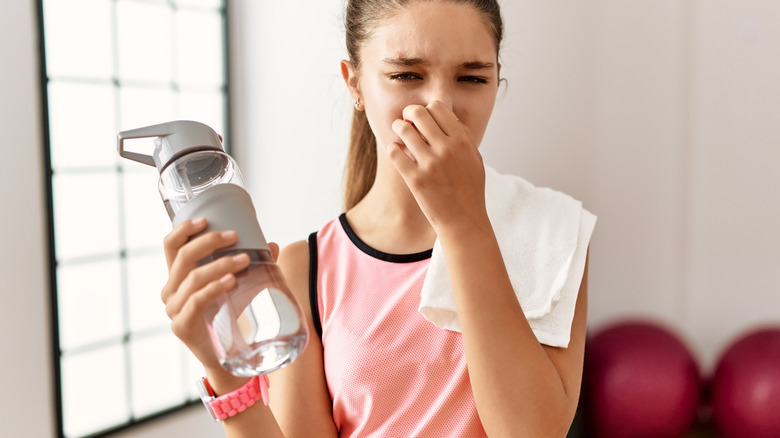Why A High-Protein Diet Makes Your Farts A Little Extra Stinky
Your health is important to you. Eating right and exercising are always at the top of your list. You've also started adding more protein to your diet to help repair muscles during your lifting sessions. However, you've noticed that all that extra protein seems to be adding a bit of extra stink in your farts.
Flatulence, more affectionately known as farting, is how your body releases excess gas in your digestive system. Gas is regular and comes from various parts of the digestive journey, according to Healthline. For example, swallowing air from chewing or treating yourself with a carbonated soda can lead to air in the digestive tract. You might also have excess gas buildup from your gut bacteria processing foods. Some foods, like beans, also create more gas than others.
However, the reason behind the stink from high-protein diets is more challenging to pinpoint than you might think. It could be due to the increase in high-sulfur foods or the additives in protein powders. Take a look at each cause and ways you might inhibit protein farts from affecting your gym time.
High sulfur foods can increase the pungency of flatulence
According to WebMD, protein requirements vary from 50 to 60 grams, depending on sex. However, high-protein diets focus on adding more protein than you typically do through various sources. Some of the most common high-protein diets, like Paleo and Atkins, concentrate on getting more meats, poultry, fish, eggs, and vegetables into your life while cutting out the carbs, per Mayo Clinic.
However, high-protein foods, like eggs, meat, chicken, broccoli, cauliflower, and Brussels sprouts, are also high in sulfur. According to WebMD, sulfur is in both cysteine and methionine, amino acids necessary for strong tissues and flexibility. Sulfur foods break down in the gut to create hydrogen sulfide, which can make your gas stinky. Research in Current Opinion in Clinical Nutrition and Metabolic Care shows that having a bit of hydrogen sulfide in your gut through the breakdown of cysteine is beneficial to health, even though it might make your gas stink. But too much can cause adverse side effects.
If you think sulfur-rich foods might be causing your pungent gas, try balancing your meals with foods low in sulfur. For example, you might eat your chicken with a salad, including carrots, celery, mushrooms, and bell peppers. It's all about balance.
Protein shakes contribute to your smelly gas
Protein powders are an easy way to add several grams of protein to your diet through a post-workout shake or morning smoothie. But these powders also contain additives and fillers for flavor and texture, which may cause what many refer to as "protein farts." But as Dr. Liz Applegate, a distinguished senior lecturer and director of sports nutrition emerita at the University of California at Davis, clarified (via Self), "I would love it if people stopped calling them 'protein farts' because protein is not the culprit; it's what it's keeping company with."
According to Healthline, protein powders are created from various natural proteins like soy and whey. Whey protein is a milk protein that contains lactose, a raw sugar found in milk and milk products. While some people are lactose intolerant, high amounts of lactose can make you extra gassy even without a lactose intolerance. Additionally, Harvard Health Publishing notes that some protein powders may contain heavy metals and pesticides, which can have various impacts on the body, such as gastrointestinal issues.
When protein powder intake might be the cause, switch your brand for a more natural one using plant proteins rather than whey. It can also be beneficial to drink ginger tea to help soothe your stomach and reduce gas, per Healthline.



